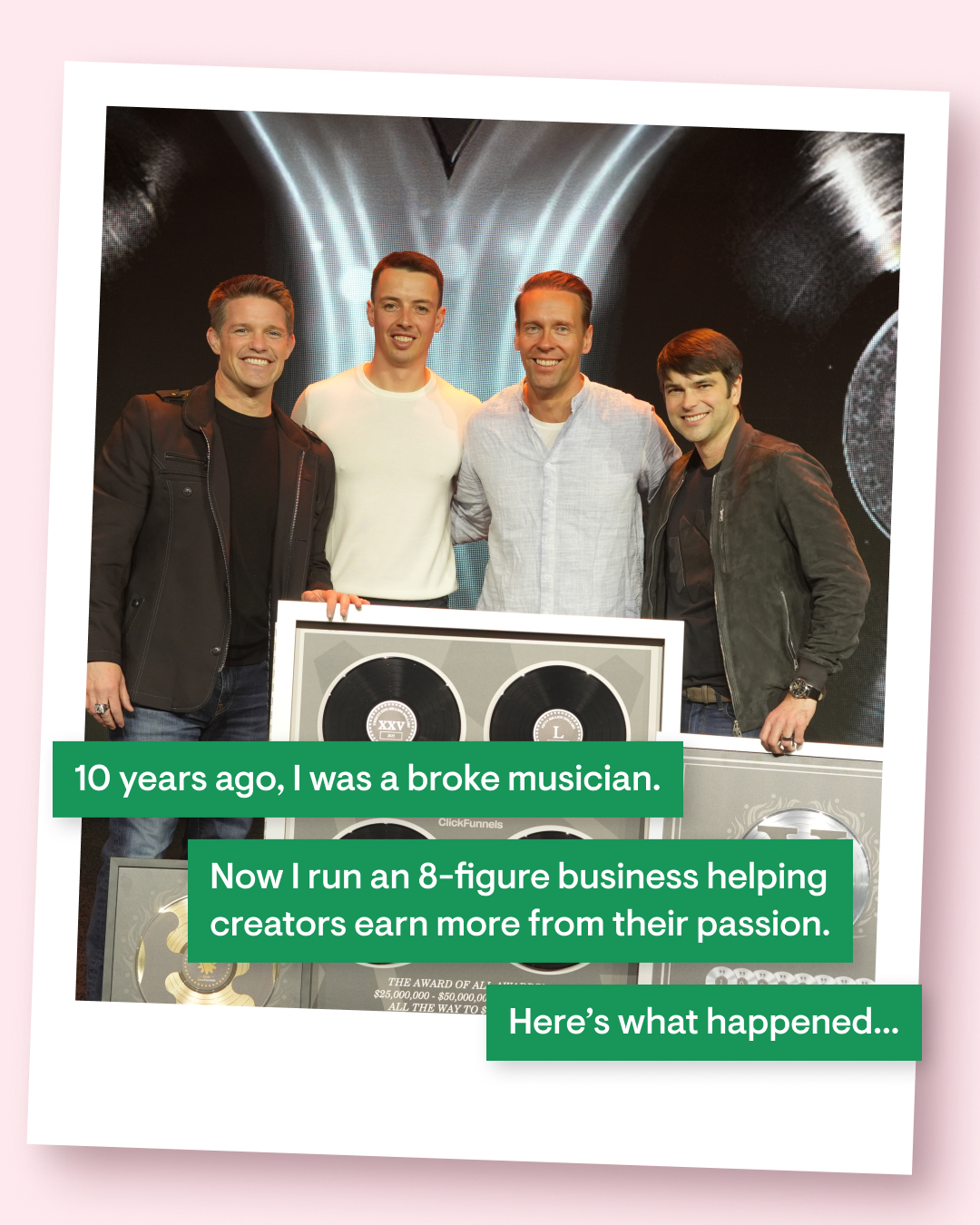What is the Passion Economy?
The passion economy is a new way for individuals to monetize their skills. It lets freelancers and entrepreneurs scale their businesses exponentially and earn passive income.
The passion economy removes the shackles associated with freelance (‘gig’ work) and provides platforms for users to produce content that can be consumed at all times.
Li Jin, Founder and Managing Partner at Atelie, calls the passion economy ‘the future of work.’ And justifiably so.
This new way of earning money makes the traditional ‘time for money’ obsolete. In the gig economy, people have to work a job while always scanning the horizon for the next one. This uncertainty causes massive financial stress.
The passion economy, on the other hand, gives you the freedom to work when you want. From anywhere you want.
It provides people with passive income and allows them to pursue their passions and positively change the world around them, it makes the world a more confident and passionate place.
We recently interviewed the author of The Passion Economy book, Adam Davidson. He shared his insights and thoughts on the passion economy and explained the rules of this new economic framework.
Where did the passion economy come from?
The last ten years have seen a revolution in work. And this shift has become even more pronounced thanks to Covid and the work-from-home culture many people met for the first time.
What society now considers a ‘job’ has changed beyond recognition.
The rise of companies like Uber, Deliveroo & Fiverr has allowed people to monetize their time in services like transport, graphic design, and food delivery.
These marketplaces allowed thousands to be self-employed, but they often required workers to focus on consistency and efficiency. They told individuals they could be their own bosses, but the reality was that they were just freelancers tied to a time card. They were trading time for money in the tough gig economy.
The reaction to this led to the creation of new digital platforms that emphasize users’ individuality. These platforms let users earn money in a way that highlights and celebrates their individual skills and personality instead of squashing them.
The passion economy was born because people wanted a way to make money by doing something they are passionate about. Instead of making money so you can do what you are passionate about in your free time.
It's a shift and a new model of entrepreneurship.
More than 50 million people worldwide consider themselves part of the passion economy. Fifty million people doing what they love to do and finding ways to earn a living from it.
With Passion.io, people can create apps and grow their online businesses without code or technical hassle. We’re a part of the passion economy.
Is the passion economy the same as the creator economy?
The creator economy is under the umbrella of the passion economy. You’ll often hear one word substituted for the other.
This is because creators are typically earning an income from doing something that they are passionate about. Like turning their fitness hobby into an online personal training app. Or a drummer who turns his passion into an online business where students can watch and learn in real time.
Why is the passion economy better than the gig economy?

The passion economy is better because the gig economy takes power away from individuals providing a service.
Freelancers have to deal with insecure revenue streams that increase their financial vulnerability.
When people don’t know where their next paycheck is coming from, they’ll often undercut each other to secure jobs. This creates a destructive cycle where freelancers undercut each other on price, companies pay less for skilled services, and freelancers need to work longer hours to make ends meet.
It's a race to the bottom with the only winner being the big, established businesses that get labor for cheap.
The passion economy rejects this business model. It shifts the power dynamic back in favor of the individual. It lets people scale their skills on a one-to-many basis.
Creators no longer need to trade time for money and fight to keep their heads above water. Instead, they can earn passive income, scale their clients exponentially, and have the freedom to work when they choose.
Is the passion economy the future of work?
Automation, globalization, and the internet have fundamentally changed the way we view work.
The concept of the ‘steady job’ is disappearing. Manual jobs and repetitive tasks are being phased out of existence, and they’re being replaced with robots and algorithms.
Self-driving cars aren’t a thing of the future anymore. The advent of this technology highlights why we need to change our relationship with work. Technology is going to make the ‘professional driver’ obsolete. People need to find new ways to make money and find meaning in their lives.
As society moves into this new age, we need to look closely at how we make money.
The 9-to-5 is history. People want flexibility, freedom, and purpose from their jobs.
Most importantly, they want to do something they’re passionate about. The passion economy meets all of these needs and in that sense, it is the future of work.
Top 3 trends in the passion creator economy
As the passion economy continues to grow with more and more people joining, keep an eye on these top trends.
- Creators moving fans off of social networks and onto their own websites, apps, and monetization tools.
- Creators becoming founders, building out teams to help them start businesses and go beyond their original starting point.
- Creators gaining power as fans seek to connect with individuals rather than faceless companies and media giants.
Where does Passion.io come in?
Passion.io is a no-code app creation platform.
We provide a suite of tools that lets individuals build their own mobile apps to teach their skills to others. We also provide the information and mindset that people need to scale their businesses and share their skills with the world.
When you decide to join the passion economy, it might seem scary at first. That's where we come in. We have the expertise and first-hand knowledge of the economy to guide and help you succeed.
Will the passion economy work for me?
“Increasingly, the lines between hobbies, careers and personal brands are blurring”, writes Adam Davidson, co-founder of NPR’s Planet Money and author of The Passion Economy.
To be eligible to join the passion economy, all you need is a skill you’re passionate about and the motivation to share it with the world.
That sounds easy enough.
Your passion can be anything. A strange collection of interests or two unrelated activities combined. To take part, you need to define your unique passion.
This is the single most important, and often hardest, part of joining the passion economy.
To be successful, you don’t need to be a celebrity with millions of followers. What you need is a highly engaged niche of people who you provide a service for.
If you’re the only person who can help this small niche of people, then you’ll always have an active and real customer base.
Defining your niche is an essential part of becoming a member of the passion economy.
Once you’ve determined this, you’re on your way to becoming an active member of the economy.
Once you’ve defined your passion, you need to market your expertise to a niche community that will go crazy for what you have to offer. When you combine your ideal customer with your passion, you’ll be blown away by how profitable the niche you’ve carved out in the passion economy can be.
Is it really possible to earn a living from your passion?
What’s your passion? Is it cooking, coding or calisthenics? Do you love fishing or furniture design?
The 21st century is moving beyond the gig economy. People are no longer trading time for money, they’re trading their skills.
Take us for example. We started because of the passion that Dan had. And now we’re helping others enter and succeed in the growing passion economy.
When we started Passion, we collaborated with social media influencers and helped them build their own online courses. We did everything for our clients from marketing and videography to creating their sales pages and websites. Everything was done in-house by our team. It was a full end-to-end service.
We learned so much during this period and it was great to see so many success stories coming from Passion.io. But we did encounter some problems that led us to change our direction.
Rewind to 2016 and we were selling simple online courses. Yet time and again, we were asked if we could build mobile apps. We got so many requests we decided that we needed to create an app. Our first app customer was BarStarzz BTX.

Building an app for them was our training ground. So we got to work, but we did it the hard way.
After hiring a development team and copywriter we were told it would take 3-4 months to build the app for $60,900. (sigh)
Halfway through this process, our freelance development team told us a new coding framework had been released. The app needed to be rebuilt from scratch. Altogether it took 11 months for our first app to be built. Needless to say, it was stressful.
It annoyed us, but it got us thinking. Building an app isn’t financially possible for most people.
The cost and time commitment means only the wealthiest individuals have the luxury of mobile app development.
It looked like the world needed an automated app-building service. A service that would take away the high costs associated with mobile app building. A service that would support and grow the passion economy.
This was how Passion.io was born.
We realized that by automating the app-building process for coaches, trainers and creators we can impact more lives with our services. This approach also gave people who previously couldn’t afford to develop an app the resources to make one.
This epiphany shifted the company’s focus towards selling our platform as a means for running your Passion business. We turned our service into a product anyone could use.
By making app creation available to everyone, we’ve leveled the playing field for budding entrepreneurs, experts, creators, and teachers.
Now it’s your turn
You didn’t end up on this page because Google randomly brought you here. You’re looking for information on the passion economy. Probably because you have a passion and you’re wondering if you could actually make a living from it.
Are we right?
The answer is yes. It takes courage and determination. But the passion economy is a growing place filled with creators just like you. And we’re here to help every step of the way.
When you’re ready to break free from what you know… we’ll be here.














